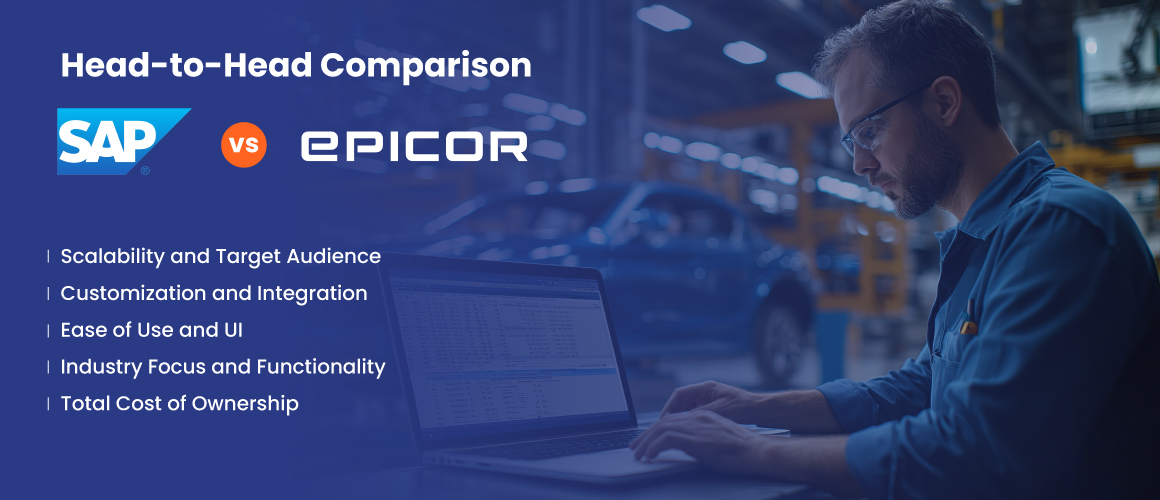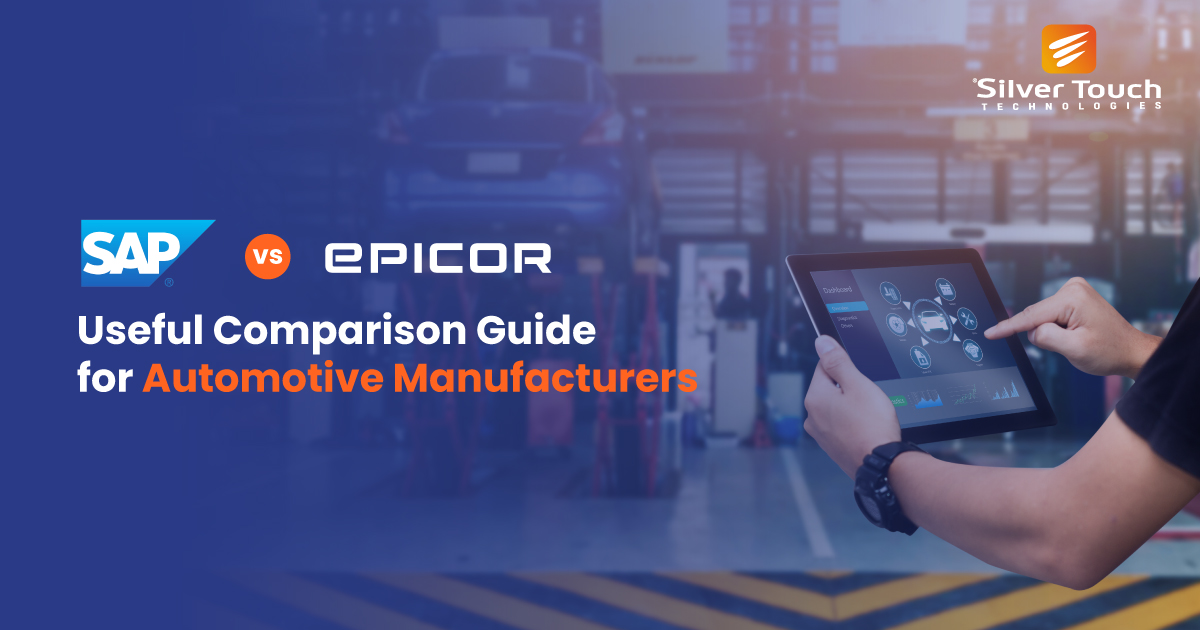An ERP system with sophisticated features and flawless functionality is a necessity for modern enterprises. Irrespective of size and sector, every industry tends to leverage the benefits of tailored ERP solutions. Several options are available in the ERP market for companies. Out of them, SAP has maintained its dominance with its range of robust solutions like SAP Business One. In this post, we will compare SAP vs Epicor, another popular ERP solution.
Whether it is manufacturing or retail, healthcare or automotive, every sector requires a solution that can manage various daily operations effectively. A customized ERP solution makes this possible while increasing efficiency and productivity. This is a major reason popularity of ERP is increasing swiftly in the corporate world. SAP and Epicor have brought advanced solutions for the automotive manufacturing sector as SAP Business One and Epicor Kinetic, respectively.
Let’s dig deep into the comparison of Epicor ERP vs SAP Business One. But, before moving ahead, it is better to understand the importance and requirements of ERP in the automotive manufacturing industry.
Importance of ERP in Automotive Manufacturing Industry
The automotive manufacturing sector is one of the highly complex and heavily regulated sectors. It has intricate supply chains consisting of numerous tiers of suppliers, vast inventories of parts, and stringent quality control standards. An ERP system for automotive manufacturing can integrate all disparate processes and act as a centralized platform. It streamlines operations and improves coordination across different departments and suppliers.
An automotive manufacturing ERP also plays a vital role in optimizing production scheduling and ensuring adherence to prevalent quality standards. It can enhance inventory and supply chain management, reducing the risk of production delays or shortages. It assists automotive manufacturers in strengthening their relations with suppliers by improving collaboration. A robust and feature-rich automotive ERP solution is crucial to drive growth.
Automotive Industry ERP Needs
The automotive industry has complex business requirements. An Enterprise Resource Planning (ERP) system can address these needs effectively across different business functions.
The automotive sector has multi-tiered supply chains with many suppliers. ERP systems can offer real-time visibility, supplier management, and logistics integration to meet this requirement. Another major requirement of the sector is production planning and scheduling with prevalent JIT (just-in-time) manufacturing principles. ERP systems can offer detailed production scheduling and capacity planning features to meet these needs.
Other features like inventory and warehouse management, quality management, and financial management are useful to address the necessities of respective departments. Let’s understand the role of ERP in automotive manufacturing by taking the example of SAP Business One and Epicor systems.
Overview of SAP Business One for Automotive Manufacturing
SAP Business One is a comprehensive and integrated ERP solution that addresses the specific needs of the small and medium-sized automotive manufacturing industries. It has built-in functionality to manage the entire value chain from procurement and supplier management through production planning and scheduling. It offers real-time visibility and extensive control over key processes.
SAP Business One is also useful for improving customer satisfaction and streamlining processes to drive profitability in the competitive automotive sector.
Overview of Epicor for Automotive Manufacturing
Epicor is a robust ERP solution that offers functionality related to supply chain management, advanced production planning, quality control, and regulatory compliance. It enables automotive manufacturers to optimize production schedules and manage BoMs (Bills of Materials) while ensuring traceability. This solution is beneficial for streamlining communication with suppliers and increasing profitability.
Epicor plays a vital role in driving growth in the automotive industry among evolving market dynamics, stringent industry regulations, and quality control requirements.
Head-to-Head Comparison- SAP vs Epicor

SAP vs Epicor comparison will help manufacturers choose the right option for their automotive companies. Though both SAP Business One and Epicor are capable of handling the key requirements of the automotive manufacturing industry, they have slight differences in strengths. Here is a head-to-head difference between Epicor ERP vs SAP Business One.
Scalability and Target Audience
SAP Business One is specifically designed for SMEs. It offers good scalability within this range and enables businesses to grow. However, it might require transitioning to SAP S/4HANA for large or complex global automotive organizations.
Epicor is useful for medium-sized to large enterprises with robust manufacturing capabilities. It can address the complexities of supply chains and meet production requirements effectively. It also offers more flexible deployment options for larger operations.
Customization and Integration
SAP B1 has several customization options with high integration capabilities with other SAP products and third-party applications. Its partner network can provide numerous add-ons.
Epicor has extensive customization and integration capabilities. It has a partner network but a smaller number of certified add-ons compared to the SAP ecosystem.
Ease of Use and UI
SAP Business One has a user-friendly and intuitive interface for enabling quicker user adoption and reduced training time. It is ideal for smaller teams.
Epicor’s user interface is described as less modern than that of SAP B1. However, its recent versions focus more on improving user experience.
Industry Focus and Functionality
SAP Business One offers a comprehensive and integrated ERP solution with features for financials, CRM, sales, inventory, and production departments. However, it might depend more on add-ons for industry-specific features like advanced EDI in the automotive sector.
Epicor is highly strong in manufacturing and distribution segments with a deep understanding of the automotive industry’s specific needs. It has advanced features for production planning, complex BOM, and robust quality management for the sector.
Total Cost of Ownership (TCO)
SAP Business One has a lower implementation cost, which is beneficial for SMEs. However, maintenance costs can be higher than Epicor over time.
Epicor has a higher upfront cost than SAP B1, especially with extensive customization. However, its concurrent user licensing model is more cost-effective for organizations with many users.
Here is a quick table of comparison between Epicor and SAP Business One.
| Aspects/Characteristics | Epicor ERP | SAP Business One |
|---|---|---|
| Scalability and Target Audience | Ideal for medium and large automotive companies | Ideal for small and medium-sized automotive companies |
| Customization and Integration | Good capability with limited add-ons | Good capability with numerous add-ons |
| Ease of Use and UI | Needs familiarity | Easy for users |
| Industry Focus and Functionality | More automotive industry specific | Requires add-ons for some industry-specific features |
| Total Cost of Ownership | Lower than SAP B1 | Higher than Epicor |
Here, we mention some important factors that can help automotive manufacturers choose the right ERP solution.
Key Decision Factors for Automotive Manufacturers
Based on the comparison between SAP vs Epicor, we can mention that automotive manufacturers should focus on specific requirements while making a decision.
Firstly, they should consider industry-specific functionality. It starts from BOM and Routing management. Other features or functionality include inventory management, production planning, and supply chain management.
Integration capability with existing systems and third-party applications is also a crucial factor to consider. Along with this, manufacturers need to ask for customization capabilities, scalability, and flexibility of the ERP solution.
Another major aspect is the deployment option. Mobile accessibility and reporting features are essential in an ideal ERP for automotive industry. With this, it is better to consider the user-friendliness of the solution.
Finally, vendor considerations come into the picture, which include the vendor’s industry experience and reliability. Automotive manufacturers should also make a proper roadmap of features and functionality to select the right ERP solution.
Concluding Lines
A comparison between Epicor vs SAP can help automotive manufacturers choose the most suitable ERP solution. Hope our discussion of key factors will assist them in making a proper decision. It is fair to mention that choosing the right ERP solution can take your company to a new level, enhancing efficiency and productivity. This decision can help you leverage the benefits of advanced features and the functionality of the ERP solution.
Silver Touch Technologies Canada is a trusted and official SAP Business One Partner. We build advanced and customized add-ons for SAP solutions for automotive manufacturers. Small and mid-sized manufacturers can leverage the benefits of SAP ERP with our expert consulting and implementation services. Contact us to learn more about the scope of SAP solutions for your automotive manufacturing company.
FAQs
Though both ERPs are suitable for small to mid-sized automotive manufacturers, SAP is a bit more advanced and meets specific automotive needs effectively after some customization.
SAP Business One is designed for small and mid-sized automotive companies and offers a more streamlined approach. However, it is a bit more complex than Epicor when it comes to customization.
Implementation of Epicor is quicker and easier compared to SAP. The specific implementation timeline depends on the scope and complexity of the project.
Yes, Epicor can handle global operations with special features. However, SAP has more robust global capabilities for international operations.



